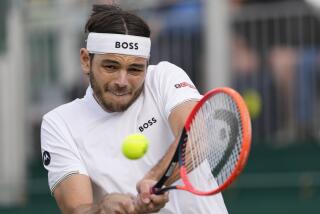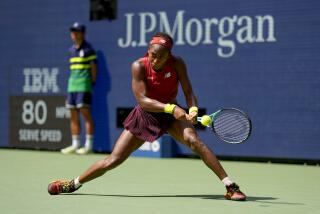FACING THE END
- Share via
WIMBLEDON, England — For so much of her career, Steffi Graf was unloved.
She bludgeoned opponents, bombarding them with a forehand women’s tennis had never seen, a forehand so meanly overwhelming that Graf became known as “Fraulein Forehand.” Her power game did not make Graf an endearing champion.
So when she gave a terse goodbye to Wimbledon on Sunday, unhappily accepting an old-fashioned whipping from new champion Lindsay Davenport and then walking off Centre Court for the last time without a tear or backward glance, without stopping to pluck a piece of grass as Martina Navratilova had, or bowing to the fans as her German countryman, Boris Becker, had, it would have been easy to say, “Same old Steffi.”
Sitting stiffly and with no hint of a smile, and even with the tone of a scold, Graf answered the question of whether she would ever play at Wimbledon again with a simple word.
No.
She chastised the man who had asked the question, saying she was tired of answering it, that it was unfair to keep hounding her. But she is 30 and her body has been betraying Graf for the last three years, keeping her sidelined for months at a time, so the questions seemed natural.
If only Graf had understood. People were asking the question because they wanted the chance to say goodbye.
If we expected tears and maybe a crumbling of Graf’s composure at her decision to walk away from her favorite tennis tournament, the place where she had proven to be almost invincible, having won seven of the nine finals she played in, sometimes winning simply by staring, then we would have missed a vital part of what made Graf a champion.
She played her first Grand Slam tournament as a 13-year-old and was a first-round loser in the Australian Open. Since then, she has won 22 Grand Slam event titles, two short of Margaret Court’s record. After winning all three she played in 1996, Graf had gone without a big title until last month’s French Open.
Injuries, mostly, had kept her out of the big matches but when she surprised herself--and us--by winning at Roland Garros, a tournament she played, by her own admission, only to help get ready for Wimbledon, it seemed possible that Graf could at least tie Court.
But Graf had always said she didn’t play for records. When she won the so-called Golden Slam in 1988--all four major titles and the Olympics--Graf said it wasn’t important. What was important was playing her best, and making her best get better every year.
That, Graf knows, she can’t do anymore. She could win another Wimbledon. Grass is still a mystery to most players. Monica Seles, Graf’s nemesis for so long, has never figured it out. But it isn’t Graf’s way to play for records. And it isn’t her way to want a series of long goodbyes.
Did you notice that Graf hardly ever smiled? She always played with a scowl it seemed and when she won--and for nearly a decade she almost always won--she never acted giddy or exhilarated. She never shed a tear. She never gave up any piece of herself for the fans, for the media, for the other players in the locker room.
As Graf passed first Chris Evert, then Martina Navratilova and became far and away the best female tennis player in the world, an uncommonly athletic player who could have excelled at many sports, she kept herself, her heart, her soul, her friendship, her counsel strictly to herself, to be shared only with her family.
It was her father’s influence people said. Peter Graf, who had given Steffi her first sawed-off racket and who seemed to drive his extraordinarily talented, supremely aloof daughter to excellence, always told people that an athlete does not befriend an opponent. It made no sense, Peter said, for Steffi to be friendly in the locker room, to eat dinner with someone she would so thoroughly pummel on another day.
This impenetrability, combined with Graf’s power and dominance of her opponents, made her easy to root against. And when a German named Guenther Parche stabbed Seles, who had overtaken Graf as the top-ranked player in the world, and then said he did it because he wanted Steffi to be No. 1, Graf came off again as unfeeling when she didn’t seem sympathetic to Seles’ pleas to have her No. 1 ranking protected as long as it took her to return to the court.
What we didn’t know was that Graf had demons too.
She was the girl who would spend days closed up in a dark room because she was so unsure of herself. This, she told in a magazine story. Those fabulous legs, long and lean and the reason for Graf’s stylish speed? She hated them. Thought they looked fat.
In everything, she needed perfection and sometimes there wasn’t much perfection in her life.
When her father made himself a tabloid cover boy by dallying romantically with a German Playboy model, Steffi never flinched. She stood by her dad in public, even if she cried in private with her mother over the betrayal. When Peter spent time in prison for evading taxes that should have been paid on his daughter’s earnings, Steffi didn’t condemn. She admitted to a big failing--trusting her dad. She took control of her own money after that, but Peter was still welcomed back to her life, even when others thought he shouldn’t be.
But after Peter’s imprisonment and the Seles stabbing, Graf’s stone-faced facade crumbled once in a while. When crowds stood and cheered in the last couple of years, she cried. She cried again at the French Open last month. It touched her, she said, all this support.
“Maybe I don’t deserve it,” she said.
But of course she does.
Graf was so unsentimental Sunday because if she had tried to speak of what saying goodbye meant, she would certainly have cried. And maybe not stopped for a very long time. This is not how she wants to be remembered, weeping. She also does not want to be remembered for any records, set or left unset.
She wants to be remembered for doing her very best.
And so Graf will be. She did her very best. She was the very best.
Diane Pucin can be reached at her e-mail address: diane.pucin@latimes.com.
YEAR BY YEAR
Record, titles (with Grand Slam event wins) and year-end ranking
1982: 0-1
Titles: 0
Ranking: 214
****
1983: 21-15
Titles: 0
Ranking: 98
****
1984: 19-14
Titles: 0
Ranking: 22
****
1985: 40-13
Titles: 0
Ranking: 6
****
1986: 64-16
Titles: 8
Ranking: 3
****
1987: 75-2
Titles: 11 (1)
Ranking: 1
****
1988: 72-3
Titles: 10 (4*)
Ranking: 1
****
1989: 86-2
Titles: 14 (3)
Ranking: 1
****
1990: 72-5
Titles: 10 (1)
Ranking: 1
****
1991: 65-8
Titles: 7 (1)
Ranking: 2
****
1992: 71-7
Titles: 8 (1)
Ranking: 2
****
1993: 76-6
Titles: 10 (3)
Ranking: 1
****
1994: 58-6
Titles: 7 (1)
Ranking: 1
****
1995: 47-2
Titles: 9 (3)
Ranking: 1
****
1996: 54-4
Titles: 7 (3)
Ranking: 1
****
1997: 16-3
Titles: 1
Ranking: 28
****
1998: 33-9
Titles: 3
Ranking: 9
****
1999: 33-8
Titles: 1 (1)
Ranking: 3
* Won Olympic gold medal
More to Read
Go beyond the scoreboard
Get the latest on L.A.'s teams in the daily Sports Report newsletter.
You may occasionally receive promotional content from the Los Angeles Times.










